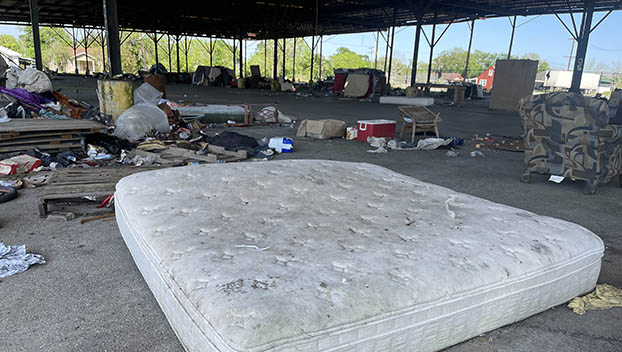Local organizations receive more than $1M to combat homelessness in Port Arthur
Published 12:40 am Saturday, March 18, 2023

- A covered area on 9th Avenue was formerly a known camp for those experiencing homelessness. (Monique Batson/The News)
|
Getting your Trinity Audio player ready...
|
The City of Port Arthur this week approved the disbursement of more than $1 million to four local organizations working to limit the number of residents experiencing or facing homelessness.
James Gilleylen with J-Quad Planning Group said in December his organization submitted an allocation plan to the U.S. Department of Housing and Urban Development in order to receive a portion of funding made available by the American Rescue Plan signed into law in 2021.
$1.9 trillion was set aside to provide relief following the continued impact on the economy, public health, government entities, individuals and businesses due to COVID-19.
HUD operates the HOME-ARP Program, which, according to information from the agency, is specifically targeted at increasing housing stability.
J-Quad requested from HOME-ARP $1,000,453 — the maximum allowance for Port Arthur. The amount was approved in total.
“Homelessness was one of the major priorities of HUD,” Gilleylen said. “That includes people who are currently homeless, people who are in jeopardy of becoming homeless and even those who are temporarily in a position where they could become homeless anytime in the future. There’s also a particular emphasis on things like violence, domestic violence and fleeing sexual abuse…human trafficking.
“Also there’s an emphasis on other populations — those people who can’t currently afford housing without paying a major portion of their income here in Port Arthur.”
Gilleylen said there are also changes to the program that expand funding available to veterans.
Under the guidelines of the HOME-ARP grants, approved entities can provide affordable rental housing, tenant-based rental assistance, supportive services and non-congregate shelter.
“HUD said we’re going to have non-congregate housing, which means that this has to be a complete unit where the person, even though they’re in a position of being in a shelter-type concern, they should have private living spaces, private spaces for bathing and private spaces for dinner preparation,” Gilleylen said.
“Recent projects in Dallas and Fort Worth actually paid for the acquisition of old motel properties, and then to create that non-congregate housing, they actually took it, converted it to kind of a townhouse type structure where they could add the bathroom, the kitchen and other facilities.”
That area, he added, received a larger amount of funds than Port Arthur.
Other examples included tiny homes built in Austin, a housing unit for seniors built in Dallas and modular housing built in Shreveport, Louisiana.
Four Port Arthur agencies requested grants from the $1,000,453.
The Salvation Army asked for $50,000, all of which was approved. Family Services of Southeast Texas requested $660,000 for non-congregate housing. J-Quad recommended the approval of $60,000 because “their request didn’t provide by definition what was to be provided in terms of independent living spaces.”
Legacy CDC asked for $810,000 of which $635,000 was approved.
“Not because it was a bad application,” Gilleylen said, “but because we only have $1,000,453.”
And Catholic Charities received $105,018 for supportive services.
Councilman Donald Frank said his concern is for those suffering from storm damage.
“One of the things that I’ve been working with and one of the things that I have been talking to the citizens about — we have still a lot of individuals who are suffering in their homes from hurricanes — from Hurricane Rita, from Hurricane Harvey,” he said. “These are senior citizens who are trying to get their homes fixed.”
And, he added, funding is no longer available through the Southeast Texas Regional Planning Commission of the Texas General Land Office.
Gilleylen said those with storm-damaged homes who are at risk of being homeless would be eligible to apply for assistance through Legacy CDC.





